Per l’inizio dell’edizione 2024 di Electropark, abbiamo avuto il piacere di parlare con Alessandro Mazzone, direttore artistico del festival.
Electropark inaugura la sua 13° edizione dal tema “Resonances” oggi, giovedì 11 luglio, ed è ancora più ricca delle precedenti. Genova e la provincia vengono valorizzate attraverso la musica, l’arte e l’inclusione, con una grande attenzione per i dettagli.
Un appuntamento colmo di prime nazionali, gender balanced e dalla forte connotazione internazionale, con più di 40 artisti provenienti da tutto il mondo. Giappone, Germania, Paesi Bassi, Stati Uniti, Spagna, Tunisia, Francia, Danimarca, Polonia, Italia, Sudafrica ed Egitto, tutti riuniti a nel capoluogo ligure.
Quella 2024 è una delle edizioni più ricche di sempre, non solo per il numero di artisti in line up. Electropark ha aggiunto molti appuntamenti alla sua programmazione. Il festival infatti è cominciato a giugno, con i due prologhi dedicati al dialogo, alla musica, alla danza, al teatro e a installazioni artistiche.
Inoltre Electropark “si fa in quattro” anche a luglio. Il festival prende il via oggi, giovedì 11 luglio, dalla Terrazza Mirador del Galata Museo del Mare al Porto Antico di Genova, dalle ore 19:30 fino alle 23:30. Protagonisti Francesca Heart, Sofie Birch & Antonina Nowacka e Lowtopic.
Si prosegue poi venerdì 12 e sabato 13 tra il Mercato dei Pescatori della Darsena, il Virgo Club e sempre il Galata Museo del Mare. Si conclude poi domenica 14 con il format “Groove Island“: spettacolare live set su una piattaforma galleggiante a largo di San Michele di Pagana, Rapallo (GE).
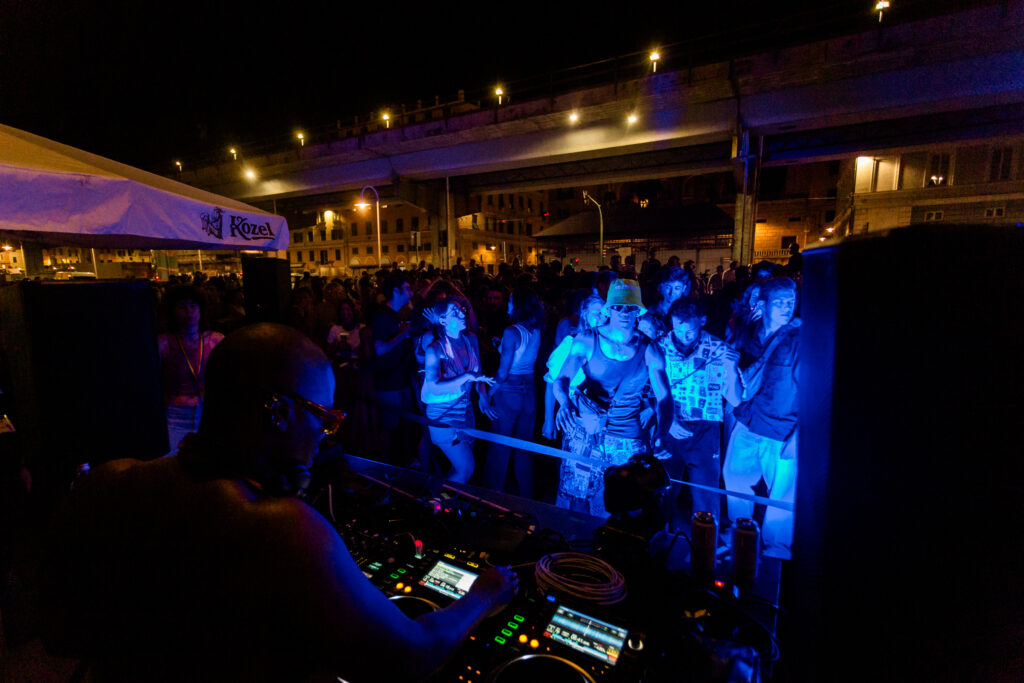
Noi di Parkett abbiamo avuto il piacere di intervistare il direttore artistico di Electropark, Alessandro Mazzone, tra le menti del progetto fin dalla prima edizione nel 2012. Con le sue parole siamo andati a fondo del progetto Electropark. Dagli inizi fino ad oggi, con idee sul futuro, e delle missioni e obiettivi che questo festival si è posto. L’intervista.
Ciao Alessandro, grazie per essere con noi. Inizio chiedendoti come stai e quali sono le emozioni a pochi giorni dalla partenza della tredicesima edizione di Electropark.
Siamo carichi ed entusiaste, non vediamo l’ora che tutto inizi: per noi, le artiste e gli artisti, e per il nostro pubblico. Se volessimo riprendere il tema di quest’anno: “siamo in risonanza”.
Negli anni grandissimi nomi da tutto il mondo hanno portato la loro musica a Electropark. In questa edizione sono più di 40 gli artisti presenti. Quando nel 2012 è nato Electropark, ti saresti immaginato di arrivare dove siete ora? Qual è il segreto della crescita di un progetto di questo genere?
Electropark è un progetto aperto, autentico, culturale, lontano da logiche commerciali, e da qualche anno transdisciplinare. Un percorso di sviluppo che ci ha portato dal classico festival di musica elettronica, seppur inedito per i luoghi utilizzati, ad un festival di musica elettronica e arti performative.
Ci piace l’ibridazione dei linguaggi, mettere insieme più dimensioni, quella artistica, organizzativa, ambientale (ed altre che verranno) tra loro connesse, con-viventi e unite dalla contemporaneità di contenuti, processi e pratiche.
È un lavoro complesso che ci porta anche a “spendere” di più, senza per forza ottenere in quantità ma ricambiando qualità verso il pubblico e le persone che lavorano con noi. Penso che aver mantenuto una linea di coerenza nel tempo, trovando nuovi approdi culturali dentro e fuori di noi, sia la cifra della crescita di Electropark.
Cosa ti rende più orgoglioso nel far parte di Electropark?
Lavorare con le persone con cui lavoro. Portare a Genova artisti internazionali e non, che propongono innovazioni musicali, non solo per tecnica performativa ma anche per poetica e temi espressi. Sorprendere il pubblico, farlo crescere culturalmente. È un impegno imprescindibile se fai parte di Electropark.
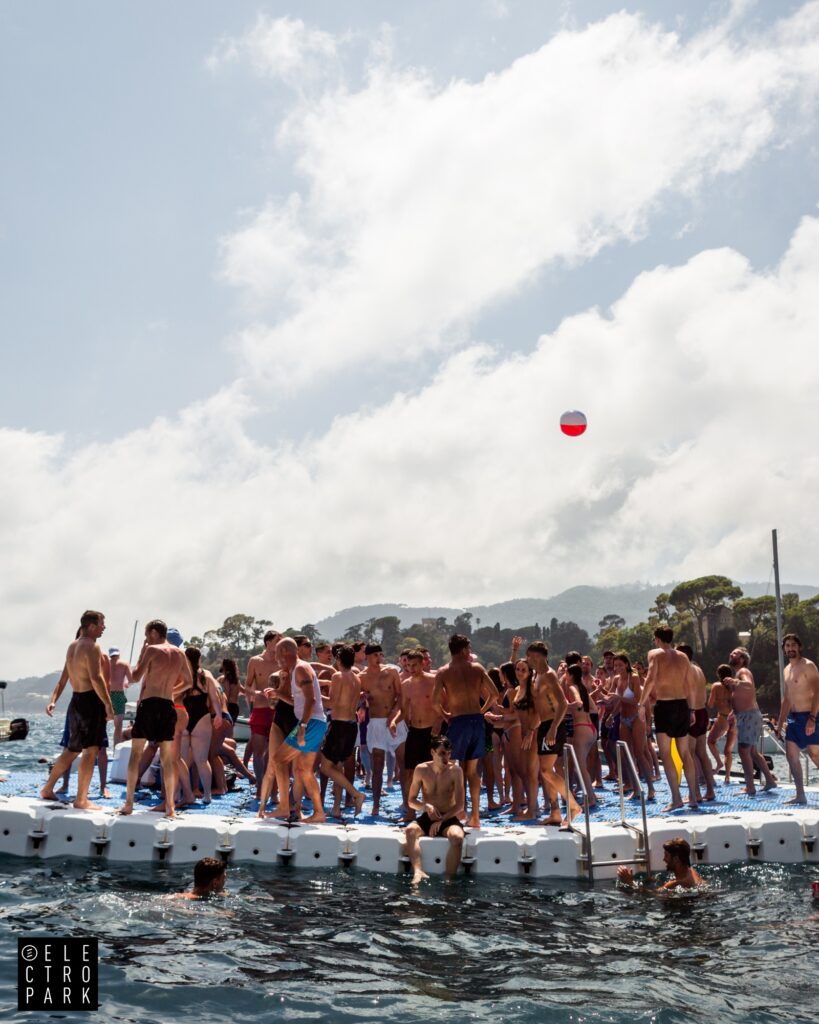
C’è qualcosa che sognavate di rendere possibile da molti anni e che proprio in questa edizione siete riusciti a realizzare?
Sì, ogni anno c’è sempre un piccolo sogno che si avvera. Quest’anno la programmazione di Electropark è rappresentata e trainata per il 70% da artiste, produttrici e DJ. Una grande presenza femminile e trans che “risuona” nel più ampio tema della gender balance.
Non so neanche se abbia senso sottolinearlo, ma anche sì. Il festival è l’anima delle persone che lo pensano, rispecchia i nostri valori. Siamo festival anche per dare dei messaggi e quello di promuovere una maggiore rappresentatività di artiste e musiciste, anche non binarie, è pienamente riconosciuto dentro e intorno a Electropark.
Ci siamo arrivati attraverso collaborazioni con reti tematiche, un’attenzione della direzione artistica al pensiero transfemminista e queer, in un processo di cura allargato ad aspetti per noi cruciali.
Che cosa ti spinge a dare sempre di più? A creare un progetto che rimanga nella memoria del pubblico e degli addetti ai lavori?
La tua domanda è importante perché coglie già alcune risposte. È vero, diamo sempre di più e ce n’è bisogno perché viviamo un’epoca segnata da troppe distrazioni e iperveloce, che tende a rimanere in superficie. Un festival, Electropark ma non solo, ha la capacità di attrarre le persone a riflettere, su sé stessi o insieme, di creare divertimento, espressione, emancipazione, performatività. Ecco, mi piace pensare che pubblico e addetti ai lavori possano trovare uno spazio personale o collettivo che possa produrre uno scambio. Certo, luci, bassi, scenografie spettacolari sono parte integrante, ma le good vibes valgono più di ogni altra cosa.
Electropark è una gemma che brilla in un territorio affascinante come quello ligure. Credi che Genova possa diventare negli anni un nuovo centro per la musica elettronica e per importanti eventi che rendano onore a questo settore? Electropark in questo è un grande esempio.
Spesso sento dire che Genova è fuori dai radar nazionali. È vero, ma non quanto prima. Manca ancora un ecosistema culturale o musicale che faccia funzionare il settore della musica elettronica. Non c’è quell’intelligenza collettiva che abbatte i muri e trasforma o fa crescere una o più scene.
Manca anche un assessore alla cultura se proprio vogliamo dirla tutta e questo pesa parecchio in termini di rappresentatività del settore e del comparto musica nella politica cittadina, si fatica molto più di prima anche solo per ottenere l’attenzione dei decisori.
Ci troviamo sorpresi quando lavoriamo all’estero, ad esempio ad Amsterdam o Berlino dove abbiamo dato vita ad alcuni progetti di ricerca con altri festival come “TranstroniX” e “Transgeographical Hydro Bodies”, promosso dal collettivo transdisciplinare Corpi Idrici nato con il festival, e riscontriamo che tutti i pezzi della filiera vanno dalla stessa parte, producendo cultura da decenni.
A Genova, ma è un problema tutto italiano, siamo sepolti dalla burocrazia che va a discapito della qualità delle proposte, mi spiace dirlo ma si perde tanto-troppo tempo e si rischia di disincentivare un settore che ha il primario obiettivo di creare bellezza e benessere. Sono in disaccordo, ci vorrebbe più coraggio e una progettualità più ampia, competente, capace di cogliere le urgenze del nostro tempo.
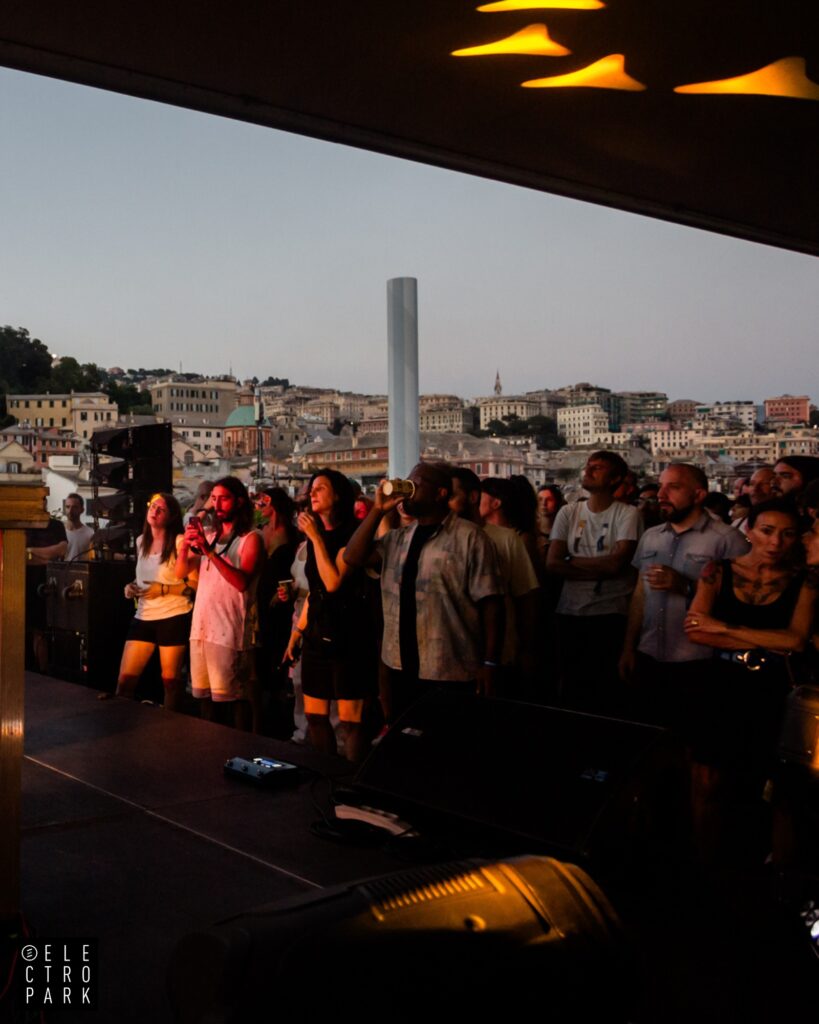
Trovate tutte le nostre interviste sul nostro sito nella sezione dedicata.
Con Electropark stiamo cercando di cambiare alcune cose nella percezione delle altre realtà operanti in città innanzitutto, collaborando con loro, provando a valorizzare identità diverse ma magari affini, cooperando senza competere, anche realizzando progetti comuni come il nuovissimo Darsena 3000. Cerchiamo di essere generosi e convincere, che poi vuol dire vincere insieme.
Un altro pezzo del lavoro lo stiamo facendo sul pubblico, aprendoci all’internazionalizzazione e a nuovi modelli di social impact che possano stimolare il ritorno ad un’autentica voglia di essere più attenti e curiosi della proposta artistica. Dobbiamo sorprendere e sorprenderci di più.
Il tema di quest’anno è “Resonances”, dal latino: eco, rimbombo, risonanza, ma anche amplificazione, oscillazione e vibrazione di suoni, energie e azioni. Perché la tredicesima edizione è quella giusta per promuovere questo tipo di messaggio?
Il termine evoca le pratiche collettive che risuonano negli ambiti e linguaggi artistici espressi da Electropark: dalla musica elettronica, alla danza, dal teatro alle arti visive. Ma non solo, come dicevo poco fa, non si tratta solo di pratiche artistiche ma anche produttive, organizzative, ambientali ecc.
È l’idea di propagazione che risulta interessante. Ma cosa si propaga attraverso atti artistici collettivi e multiformi? I temi urgenti, come quello delle repressioni violente a livello politico o dell’emergenza climatica per rimanere sulla questione ambientale; le comunità sottorappresentate (come, ad esempio, quella LGTBQ o le comunità di persone vittime di razzismo; i luoghi perduti, come quelli in cui ci si ritrovava per formare comunità di scopo o di interesse. Collettivi non solo come somma di valori ma catalizzatori di energie che amplificano in modo esponenziale e inedito i messaggi presentati in forma artistica.

Questa risonanza ha coinvolto in primis anche noi di Forevergreen, ci ha messo alla prova. Abbiamo aperto dei dibattiti interni che hanno contribuito alla nostra crescita culturale, per poterla trasferire anche all’esterno, al nostro pubblico.
Nel prologo di giugno gli artisti hanno apprezzato tantissimo questo approccio, ne sono testimonianza anche le loro voci raccolte nel podcast Evergreen.
Quale potrebbe essere una futura evoluzione del festival? Vedremo mai un Electropark itinerante al di là dei confini genovesi?
Itinerante sì, non so dirti se a livello geografico. A giugno abbiamo organizzato il prologo del festival in un contesto teatrale ed espositivo, collaborando co il Teatro della Tosse e Palazzo Ducale Fondazione per la Cultura, portando diversi spettacoli multi-transdisciplinari che hanno raccontato diverse storie, risuonando attraverso la musica, la danza, lo storytelling, il clubbing, con ospiti internazionali provenienti da diverse scene: dalla Bielorussia, all’Olanda, dall’Italia al Portogallo. Lì è scattato un click, per noi e per il nostro pubblico, per gli artisti e le artiste. È stato davvero un grande successo, ma non voglio svelare i motivi perché da lì partiremo per il lavoro nel prossimo triennio di Electropark.
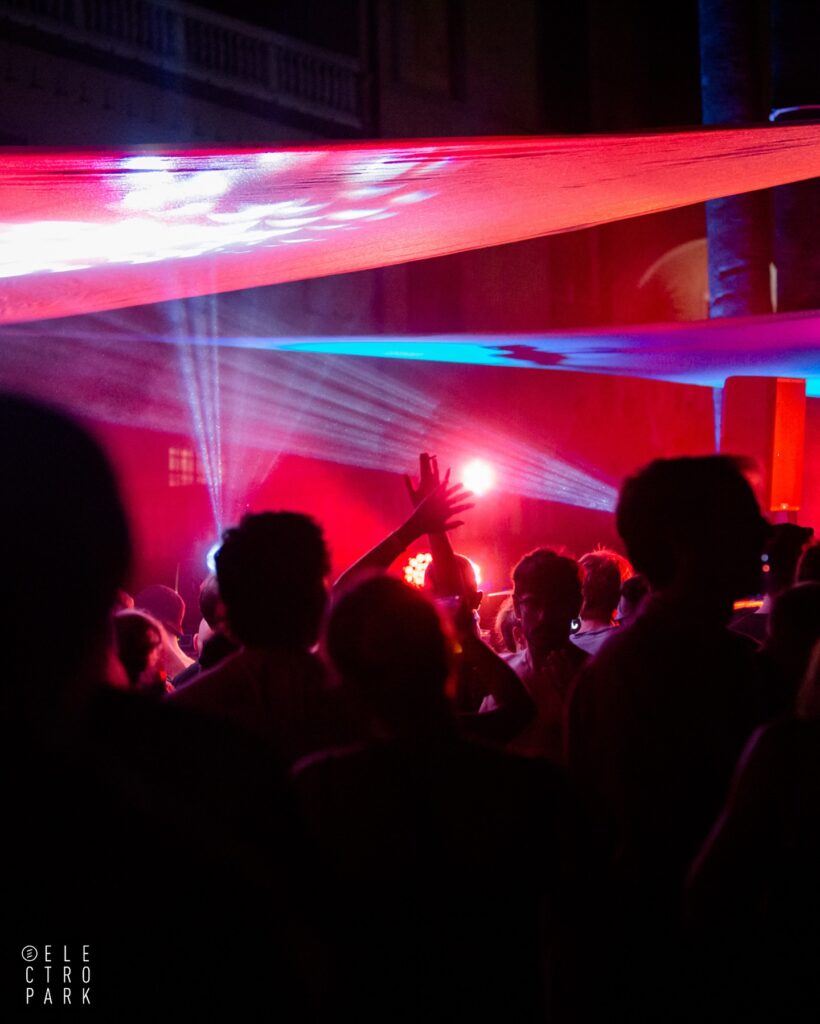
Il festival si pone oltre i già ampi confini della sola musica: il teatro, l’arte, il confronto e tanti altri temi sono stati, come detto, protagonisti dei due prologue nel mese di giugno. Nella società odierna, volatile, spesso della noncuranza e del distacco dalla realtà, quanto è importante comunicare la cultura?
La pensiamo allo stesso modo. È importantissimo, fondamentale per un festival, uno dei pochi baluardi ancora capace di mettere insieme tanti pezzi sociali. Mi immagino un festival come una micro-città dove le persone si comportano, si relazionano, si emozionano. A noi l’arduo lavoro di farli sentire a casa (ma non troppo).
Per concludere, ti ringrazio per la disponibilità, e ti chiedo: come vedi Alessandro Mazzone ed Electropark tra cinque anni?
Li vedo, ma non saprei definirli. Grazie a te per queste domande così puntuali che andavano in profondità, mi hanno fatto godere.
Mi sono dimenticato di dirti chi suona! Vabbè per quello basta leggere il programma, prendere il biglietto e venire a Genova da giovedì 11 a domenica 14 luglio.
ENGLISH VERSION
For the start of the 2024 edition of Electropark, we had the pleasure of talking to Alessandro Mazzone, the festival’s artistic director.
Electropark opens its 13th edition “Resonances” today, Thursday 11 June, and is even richer than its predecessors. Genoa and its province are enhanced through music, art, and inclusion, with great attention to detail.
An appointment full of national premieres, gender balanced and with a strong international connotation, with more than 40 artists from all over the world. Japan, Germany, the Netherlands, the United States, Spain, Tunisia, France, Denmark, Poland, Italy, South Africa and Egypt, all gathered in the Ligurian capital.
The 2024 edition is one of the richest ever, not only because of the number of artists in the line-up, but also because it has added many events to its programme. In fact, the festival started in June, with the two prologues dedicated to dialogue, music, dance, theatre and art installations.
Moreover, Electropark ‘goes all out’ in July as well. The festival kicks off today, Thursday 11 June, from the Terrazza Mirador of the Galata Museo del Mare at the Porto Antico in Genoa, from 7.30 pm until 11.30 pm, with Francesca Heart, Sofie Birch & Antonina Nowacka and Lowtopic.
It then continues on Friday 12 and Saturday 13 between the Darsena Fishermen’s Market, the Virgo Club and again the Galata Museo del Mare, until Sunday 14 with the “Groove Island” format: a spectacular live set on a floating platform off San Michele di Pagana, Rapallo (GE).
And for the start of the 2024 edition, we at Parkett had the great pleasure of interviewing the artistic director of Electropark, Alessandro Mazzone, among the minds behind the project since the first edition in 2012. With his words, we got to the bottom of the Electropark project, from its beginnings to the present day, with ideas on the future, and the missions and goals that this festival has set for itself. The interview.
Hi Alessandro, thanks for being with us. I’ll start by asking you how you are and what your emotions are a few days before the start of the thirteenth edition of Electropark.
We are charged up and enthusiastic, we can’t wait for everything to start: for us, the artists, and for our audience. If we wanted to take up this year’s theme: ‘we are in resonance’.
Over the years big names from all over the world have brought their music to Electropark, and this year there are more than 40 artists present. When Electropark was born in 2012, did you imagine you would get where you are now? What is the secret of the growth of such a project?
Electropark is an open, authentic, cultural project, far from commercial logic, and for some years now, transdisciplinary. A path of development that has taken us from the classic electronic music festival, albeit unprecedented for the venues used, to a festival of electronic music and performing arts.
We like the hybridisation of languages, bringing together several dimensions – artistic, organisational, environmental (and others to come) – that are connected, coexisting and united by the contemporaneity of content, processes and practices.
It is a complex work that also leads us to ‘spend’ more, without necessarily achieving quantity but reciprocating quality towards the public and the people who work with us. I think that having maintained a line of consistency over time, finding new cultural landings inside and outside of us, is the key to Electropark’s growth.
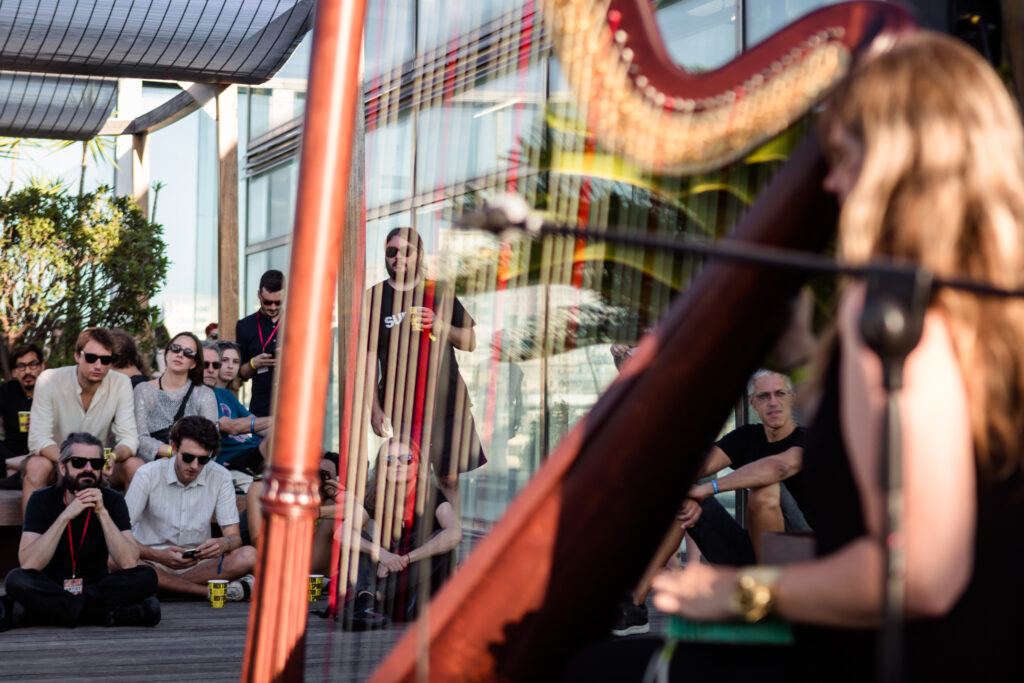
What makes you most proud of being part of Electropark?
Working with the people I work with. Bringing international artists and others to Genoa who propose musical innovations, not only in terms of performance technique but also of poetics and themes expressed. Surprising the public, making it grow culturally. This is an essential commitment if you are part of Electropark.
Is there something that you have dreamed of making possible for many years and that you managed to achieve in this edition?
Yes, every year there is always a little dream come true. This year the Electropark programme is 70% represented and driven by female artists, producers and DJs. A large female and trans presence that ‘resonates’ with the broader theme of gender balance.
I don’t even know if it makes sense to emphasise this, but it does: the festival is the soul of the people who think it, it reflects our values, we are festivals also to give messages, and that of promoting a greater representation of female artists and musicians, also non-binary, is fully recognised in and around Electropark.
We got there through collaborations with thematic networks, a focus of the artistic direction on transfeminist and queer thought, in a process of care extended to aspects that are crucial for us.
What drives you to give more and more? To create a project that remains in the memory of the public and insiders?
Your question is important because it already grasps some of the answers: it is true, we always give more and there is a need to do so because we live in an era marked by too many distractions and hyper speed, which tends to remain on the surface. A festival, Electropark but not only, has the ability to attract people to reflect, on themselves or together, to create fun, expression, emancipation, performativity. Here, I like to think that audience and insiders can find a personal or collective space that can produce an exchange. Sure, lights, bass, spectacular sets are an integral part, but good vibes are worth more than anything else.
Electropark is a gem shining in a fascinating area like Liguria. Do you believe that over the years Genoa can become a new centre for electronic music and for important events that honour this sector? Electropark is a great example of this.
I often hear that Genoa is off the national radar. That is true, but not as much as before. There is still a lack of a cultural or musical ecosystem that makes the electronic music sector work, a lack of that collective intelligence that breaks down walls and transforms or grows one or more scenes.
There is also a lack of a councillor for culture if you really want to put it bluntly, and this weighs heavily in terms of the representativeness of the sector and the music industry in city politics, we struggle much more than before just to get the attention of decision-makers.
Find all our interviews on our website in the dedicated section.
We find ourselves surprised when we work abroad, for example in Amsterdam or Berlin, where we have set up some research projects with other festivals such as ‘TranstroniX’ and ‘Transgeographical Hydro Bodies’, promoted by the transdisciplinary collective ‘Corpi Idrici’ that was born with the festival, and we find that all the pieces of the chain are on the same side, producing culture for decades.
In Genoa, but it is an all-Italian problem, we are buried by bureaucracy that is to the detriment of the quality of the proposals, I am sorry to say, but we waste too much time and risk discouraging a sector that has the primary objective of creating beauty and wellbeing. I disagree, what is needed is more courage and a broader, more competent planning, capable of grasping the urgencies of our time.
With Electropark we are trying to change a few things in the perception of the other realities operating in the city first of all, collaborating with them, trying to valorise different but perhaps similar identities, cooperating without competing, even realising common projects such as the brand new Darsena 3000. We try to be generous and convincing, which then means winning together.
Another piece of work we are doing on the public, opening up to internationalisation and new models of social impact that can stimulate a return to a genuine desire to be more attentive and curious about artistic proposals. We must surprise and surprise ourselves more.
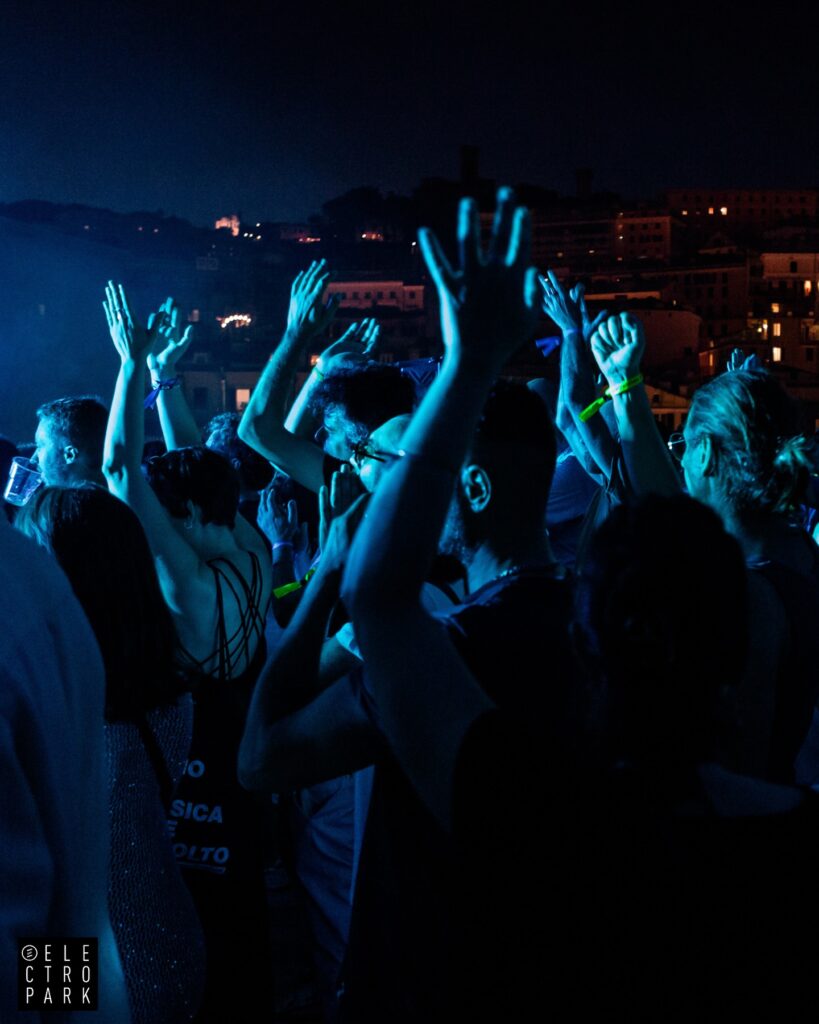
This year’s theme is ‘Resonances’, from Latin: echo, rumble, resonance, but also amplification, oscillation and vibration of sounds, energies and actions. Why is the 13th edition the right one to promote this type of message?
The term evokes the collective practices that resonate in the fields and artistic languages expressed by Electropark: from electronic music to dance, from theatre to visual arts. But not only that, as I said earlier, it is not only about artistic practices, but also productive, organisational, environmental, etc.
It is the idea of propagation that is interesting. But what propagates through collective and multiform artistic acts? Urgent issues, such as violent political repression or the climate emergency to stay on the environmental issue; underrepresented communities, such as LGTBQ or communities of people who are victims of racism; lost places, such as those where people used to gather to form communities of purpose or interest. Collectives not only as a sum of values but as catalysts of energies that exponentially and unprecedentedly amplify the messages presented in artistic form.
This resonance has also primarily involved us at Forevergreen, it has challenged us. We have opened up internal debates that have contributed to our cultural growth, so that we can also transfer it outside, to our audience.
In the prologue in June, the artists appreciated this approach very much, their voices also testified to this in the Evergreen podcast.
What could be a future evolution of the festival? Will we ever see a travelling Electropark beyond the borders of Genoa?
Itinerant yes, I can’t tell you if geographically. In June, we organised the prologue of the festival in a theatre and exhibition context, collaborating with Teatro della Tosse and Palazzo Ducale Fondazione per la Cultura, bringing several multi-transdisciplinary shows that told different stories, resonating through music, dance, storytelling, clubbing, with international guests from different scenes: from Belarus to Holland, from Italy to Portugal. There it clicked, for us and for our audience, for the artists and performers. It was really a great success, but I don’t want to give away the reasons because we will start from there for the work in the next three years of Electropark.
The festival goes beyond the already broad boundaries of music alone: theatre, art, confrontation and many other topics were, as mentioned, the protagonists of the two prologues in June. In today’s volatile society, often one of carelessness and detachment from reality, how important is it to communicate culture?
We think the same way. It is very important, fundamental for a festival, one of the few bastions still capable of putting together so many social pieces. I imagine a festival as a micro-city where people behave, relate, get excited. It is up to us to make them feel at home (but not too much).
To conclude, thank you for your availability, and I ask you: how do you see Alessandro Mazzone and Electropark in five years’ time?
I see them, but I cannot define them. Thank you for such timely questions that went deep, they made me enjoy it.
I forgot to tell you who plays! Well, for that just read the programme, get your ticket and come to Genoa from Thursday 11 to Sunday 14 July
